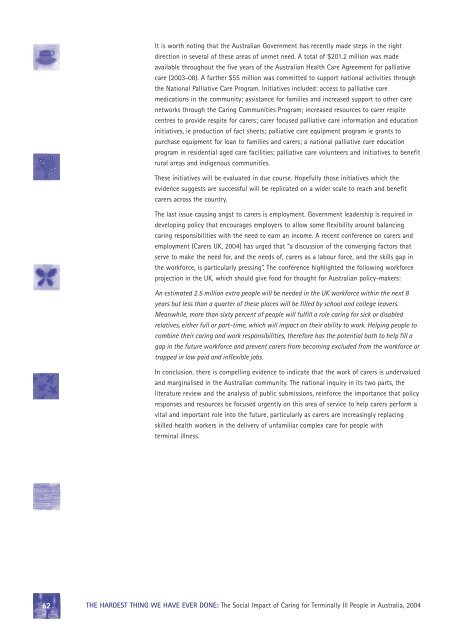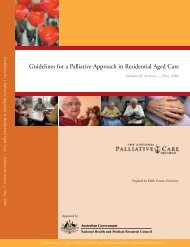The hardest thing we have ever done - Palliative Care Australia
The hardest thing we have ever done - Palliative Care Australia
The hardest thing we have ever done - Palliative Care Australia
You also want an ePaper? Increase the reach of your titles
YUMPU automatically turns print PDFs into web optimized ePapers that Google loves.
It is worth noting that the <strong>Australia</strong>n Government has recently made steps in the right<br />
direction in s<strong>ever</strong>al of these areas of unmet need. A total of $201.2 million was made<br />
available throughout the five years of the <strong>Australia</strong>n Health <strong>Care</strong> Agreement for palliative<br />
care (2003-08). A further $55 million was committed to support national activities through<br />
the National <strong>Palliative</strong> <strong>Care</strong> Program. Initiatives included: access to palliative care<br />
medications in the community; assistance for families and increased support to other care<br />
networks through the Caring Communities Program; increased resources to carer respite<br />
centres to provide respite for carers; carer focused palliative care information and education<br />
initiatives, ie production of fact sheets; palliative care equipment program ie grants to<br />
purchase equipment for loan to families and carers; a national palliative care education<br />
program in residential aged care facilities; palliative care volunteers and initiatives to benefit<br />
rural areas and indigenous communities.<br />
<strong>The</strong>se initiatives will be evaluated in due course. Hopefully those initiatives which the<br />
evidence suggests are successful will be replicated on a wider scale to reach and benefit<br />
carers across the country.<br />
<strong>The</strong> last issue causing angst to carers is employment. Government leadership is required in<br />
developing policy that encourages employers to allow some flexibility around balancing<br />
caring responsibilities with the need to earn an income. A recent conference on carers and<br />
employment (<strong>Care</strong>rs UK, 2004) has urged that “a discussion of the converging factors that<br />
serve to make the need for, and the needs of, carers as a labour force, and the skills gap in<br />
the workforce, is particularly pressing”. <strong>The</strong> conference highlighted the following workforce<br />
projection in the UK, which should give food for thought for <strong>Australia</strong>n policy-makers:<br />
An estimated 2.5 million extra people will be needed in the UK workforce within the next 8<br />
years but less than a quarter of these places will be filled by school and college leavers.<br />
Meanwhile, more than sixty percent of people will fulfill a role caring for sick or disabled<br />
relatives, either full or part-time, which will impact on their ability to work. Helping people to<br />
combine their caring and work responsibilities, therefore has the potential both to help fill a<br />
gap in the future workforce and prevent carers from becoming excluded from the workforce or<br />
trapped in low paid and inflexible jobs.<br />
In conclusion, there is compelling evidence to indicate that the work of carers is undervalued<br />
and marginalised in the <strong>Australia</strong>n community. <strong>The</strong> national inquiry in its two parts, the<br />
literature review and the analysis of public submissions, reinforce the importance that policy<br />
responses and resources be focused urgently on this area of service to help carers perform a<br />
vital and important role into the future, particularly as carers are increasingly replacing<br />
skilled health workers in the delivery of unfamiliar complex care for people with<br />
terminal illness.<br />
62 THE HARDEST THING WE HAVE EVER DONE: <strong>The</strong> Social Impact of Caring for Terminally Ill People in <strong>Australia</strong>, 2004
















